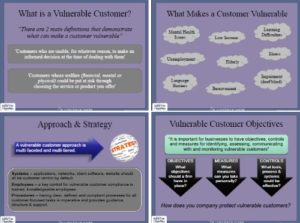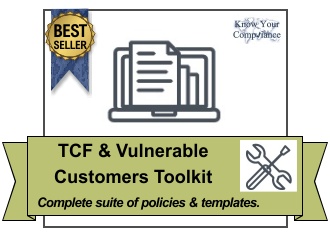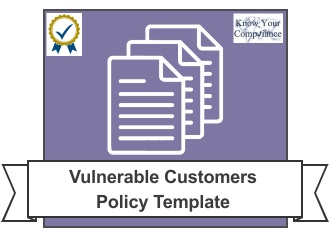Vulnerable Customers Employee Training
Vulnerable Customers Training
The fair treatment of consumers and vulnerable customer awareness has always been one of the FCA’s key priorities, but with the publication of guidance paper FG21/1 in February 2021, the regulator has set out numerous objectives, obligations and expectations that all regulated firms are required to understand and meet.
 Vulnerable customer awareness goes hand in hand in Treating Customers Fairly (TCF), which is one of the FCA’s principles for business. Ensuring good outcomes and that all interactions and communications are fair, consistent and compliant are mandatory requirements.
Vulnerable customer awareness goes hand in hand in Treating Customers Fairly (TCF), which is one of the FCA’s principles for business. Ensuring good outcomes and that all interactions and communications are fair, consistent and compliant are mandatory requirements.
The FCA have said “We expect firms to provide their customers with a level of care that is appropriate given the characteristics of the customers themselves. The level of care that is appropriate for vulnerable consumers may be different from that for others and firms should take particular care to ensure they are treated fairly. If firms do not understand the characteristics of vulnerability of their target market and main customer base, and so fail to ensure staff, products and services meet these needs, customers may suffer poor or inconsistent outcomes, or increased risk of harm.”
Any vulnerable customers training package should provide employees with an understanding of the vulnerable customers principles: –
- Provide consumers with an appropriate degree of protection.
- Understand the needs of their target market and customer base.
- Train staff to recognise and respond to the needs of vulnerable customers.
- Consider customer needs from product design through to communications.
- Monitor and assess vulnerable customer controls and solutions.
- Offer consistently fair treatment.
Vulnerable Customers Policy
Your employees may interact with vulnerable customers in a variety of ways (i.e. face to face, telephone, online, email, products/service design/development, system set up etc), so it is important that you tailor any training and its delivery to match the employee and role you are targeting.
Ensuring that employees have access to your vulnerable customer policy, controls and measures is important. Employees need to understand how you approach the management of vulnerable customers as well as the regulatory requirements.
Why Choose PowerPoint Over an LMS?
 In today’s digital age, many commercial training sessions are now delivered via Learning Management Systems (LMS), offering users the ability to complete training online, individually and in their own time. Whilst we advocate the use of LMS training in many categories, compliance is not one of them!
In today’s digital age, many commercial training sessions are now delivered via Learning Management Systems (LMS), offering users the ability to complete training online, individually and in their own time. Whilst we advocate the use of LMS training in many categories, compliance is not one of them!
The benefits of human interaction and group dynamics when it comes to compliance training cannot be overstated. While online training has many positives, it often loses the human element that is essential in ensuring that training is effective, adequate and understood.
A sole user going through online pages and selecting answers is no substitute for group discussions, Q&A’s, interactive content and most of all – a trainer’s ability to see, watch and know when a trainee is misunderstanding or not engaged.




